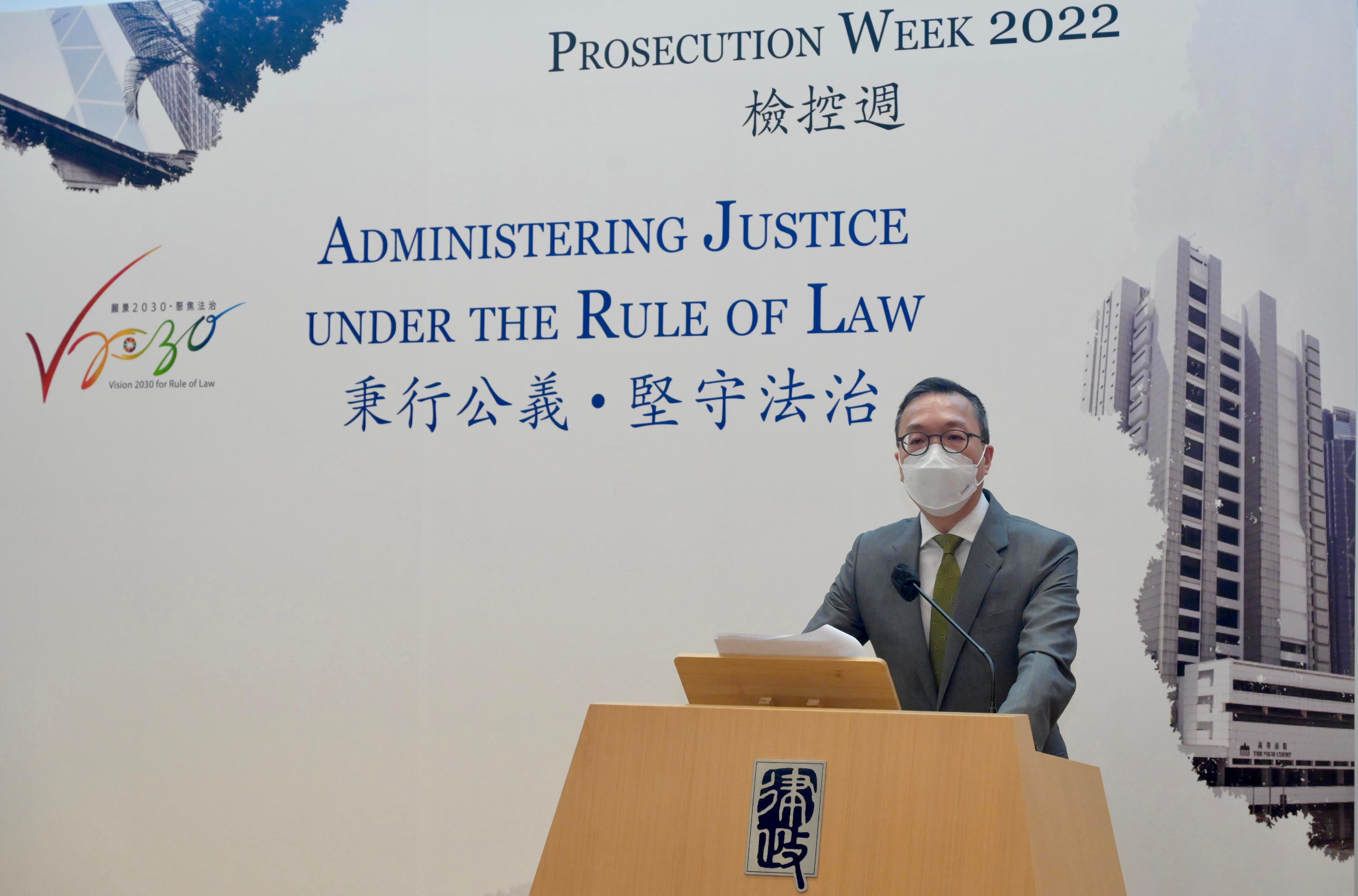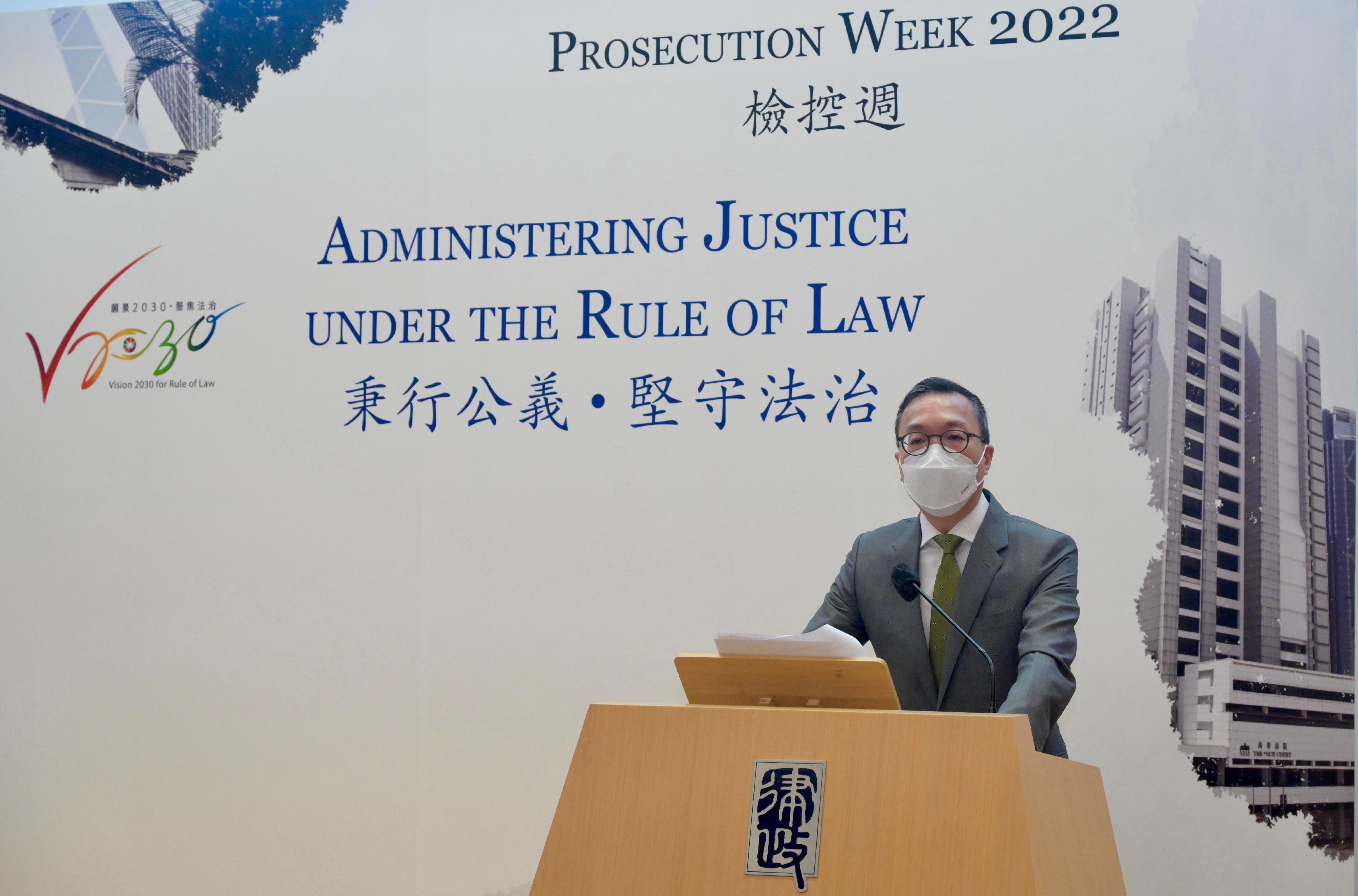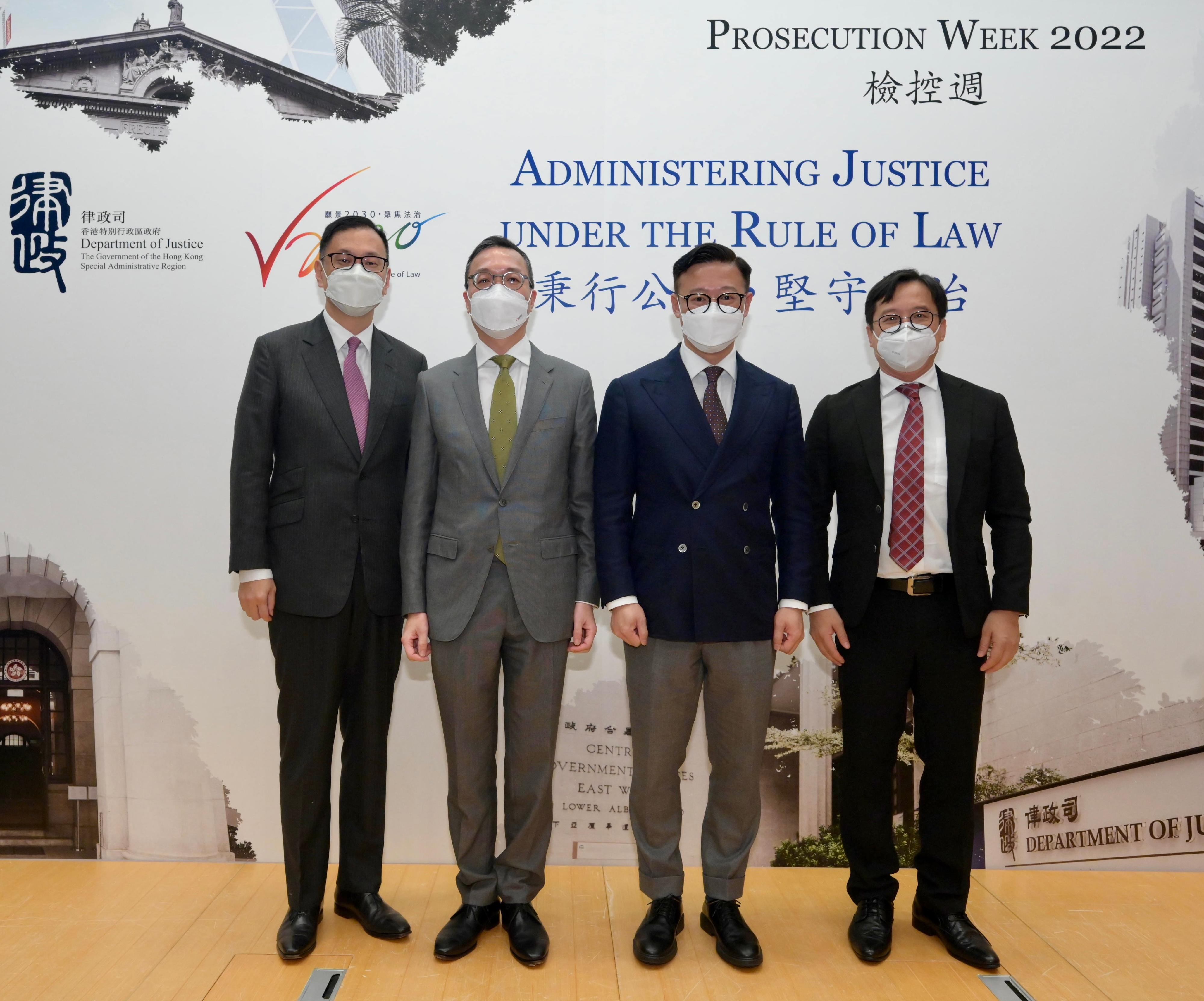Following is the speech by the Secretary for Justice, Mr Paul Lam, SC, at the opening ceremony of Prosecution Week 2022 today (August 3):
Chairman of the Bar (Chairman of the Hong Kong Bar Association, Mr Victor Dawes, SC), President of the Law Society (President of the Law Society of Hong Kong, Mr Chan Chak-ming), government colleagues, distinguished guests, ladies and gentlemen,
It is my great pleasure to welcome all of you today for the opening of the Prosecution Week 2022 organised by the Prosecutions Division of the Department of Justice.
The Prosecution Week was launched for the first time in 2012 and this year marks its 10th anniversary. I still remember back in 2017, I was sitting in Mr Dawes' chair and speaking as the Chairman of the Hong Kong Bar. Life is so unpredictable.
President Xi said on July 1, 2022, that we must maintain Hong Kong's distinctive advantages, one of which is the common law system. The obvious reason is that the rule of law in Hong Kong, being one of its most important bedrocks of success, is based on our common law system. It is crucial to maintain the public's support, trust and confidence in our legal system. It would be very difficult, if not impossible, to earn such support, trust and confidence unless the general public has some basic understanding of how the criminal justice system works, including the role of the prosecutors and the basic principles under which the prosecutors perform their duties. It is for this reason that the Prosecutions Division has been organising the Prosecution Week. The theme chosen this year is "Administering Justice under the Rule of Law" (ã€Œç§‰è¡Œå…¬ç¾©ï¼Žå …å®ˆæ³•æ²»ã€�).
Chapter III of the Basic Law is entitled "Fundamental Rights and duties of the Residents". Most people have focused their attention on Articles 24 to 41, which set out various individual rights and freedoms. But what must not be overlooked is Article 42 at the end of this chapter, which reads "Hong Kong residents and other persons in Hong Kong shall have the obligation to abide by the laws in force in the Hong Kong Special Administrative Region". The rule of law can only exist and prevail in a society where people are willing to, and in fact, obey the law. It follows that people who breach the law should be brought to justice.
For this reason, one of the important aspects of the rule of law in Hong Kong is the proper administration of criminal justice. The proper conduct of prosecutions lies at the heart of the proper administration of the criminal justice system. As acknowledged in the Introduction of our Prosecution Code, "(t)he community has a vested interest in the proper conduct of its prosecutions and in furthering the criminal justice imperative that the guilty are convicted and the innocent are acquitted."
As highlighted by my colleague Ms Yang (Director of Public Prosecutions (DPP), Ms Maggie Yang), Article 63 of the Basic Law stipulates that the Department of Justice shall control criminal prosecutions, free from any interference. This fundamental principle of prosecutorial independence was described by the Court of Appeal in a leading case Re C (A Bankrupt) (Re C (A Bankrupt) [2006] 4 HKC 582 at 590) as "a linchpin of the rule of law". I wish to take this opportunity to highlight two important points about this vital principle.
First, this principle applies to prosecutorial decisions in general, and is not confined merely to the decision whether any person should be prosecuted or any prosecution should be discontinued. For example, it applies to the choice of venue for trial such as whether it should take place before a judge in the District Court or a jury in the High Court. As decided by the Court of Appeal in Tong Ying Kit case (Tong Ying Kit v Secretary for Justice [2021] 3 HKLRD 350), it also applies to the decision by the Secretary for Justice to issue a non-jury trial certificate under Article 46(1) of the National Security Law, which provides that the Secretary for Justice may issue a certificate directing that the case shall be tried without a jury by a panel of three judges on prescribed grounds.
Second, the word "any" in the phrase "free from any interference" in Article 63 of the Basic Law must mean that prosecutorial decisions shall be free from any form of interference. It is well established that it includes judicial interference; and therefore, prosecutorial decisions are not amenable to conventional judicial review challenge, and the court will not and cannot intervene save perhaps in extremely rare and exceptional circumstances. In the light of the recent threats made by some foreign politicians to impose sanctions on me and some of my colleagues carrying out prosecutorial duties, I need to stress that freedom from any interference must include foreign interference. Prosecutorial independence is indeed a universal norm. The Guidelines on the Role of Prosecutors adopted by the Eighth United Nations Congress on the Prevention of Crime and the Treatment of Offenders, held in Havana, Cuba, in 1990 provides that "States shall ensure that prosecutors are able to perform their professional functions without intimidation, hindrance, harassment, improper interference…" For any foreign power which, on the one hand, proclaims that its upholds the rule of law and insists on a rule-based international order, yet on the other hand, seeks to resort to intimidations in an attempt to influence the conduct of prosecutions in another jurisdiction, with respect, there appears to be two possibilities only: first, that foreign power is hopelessly ignorant; alternatively and perhaps more likely, it is a shameless double-standard hypocrite.
As the Secretary for Justice, I would strive to ensure that all prosecutors can discharge their duties independently without fear.
Having said all these, I wish and need to emphasise and reassure the general public that prosecutorial decisions will be made strictly in accordance with the law, the evidence and the Prosecution Code. Let me say this very loud and clear: in Hong Kong, prosecutions are not persecutions, and prosecutions will never be persecutions. Prosecutors will abide by the fundamental principle that they "are to regard themselves as ministers of justice, and not to struggle for a conviction". Paragraph 10.66 of the Code of Conduct of the Hong Kong Bar provides that "It is not the duty of Prosecuting Counsel to obtain a conviction by all means at his command but rather to lay before the Court or the jury fairly and impartially the whole of the facts which comprise the case for the prosecution and to assist the Court on or, to see that the jury are properly instructed in, all matters of law applicable to the case".
Before I conclude, I wish to express my gratitude to my colleague Ms Yang, the DPP, and colleagues in the Prosecutions Division for their efforts and contributions, not only with regard to the organisation of the Prosecution Week programme, but also in respect of the work they have done in discharging their duties as public prosecutors. I have every confidence that the DPP and her team will continue to discharge their duties diligently and professionally.
I would also like to take this opportunity to express my thankfulness to all the participating schools, the Bar Association, the Law Society, our colleagues in other government departments, and various law enforcement agencies for coming to this ceremony today. Your continued support to the Prosecution Week over the years is very much appreciated.
Last but not the least, I congratulate the winners of the "Justice Cup" and the Logo Design Competition. I am impressed that at such a young age, you have demonstrated an abundance of knowledge in criminal law and also creativity in illustrating the spirit of rule of law artistically.
On this note, I now formally declare the commencement of the Prosecution Week 2022.
Thank you very much.


